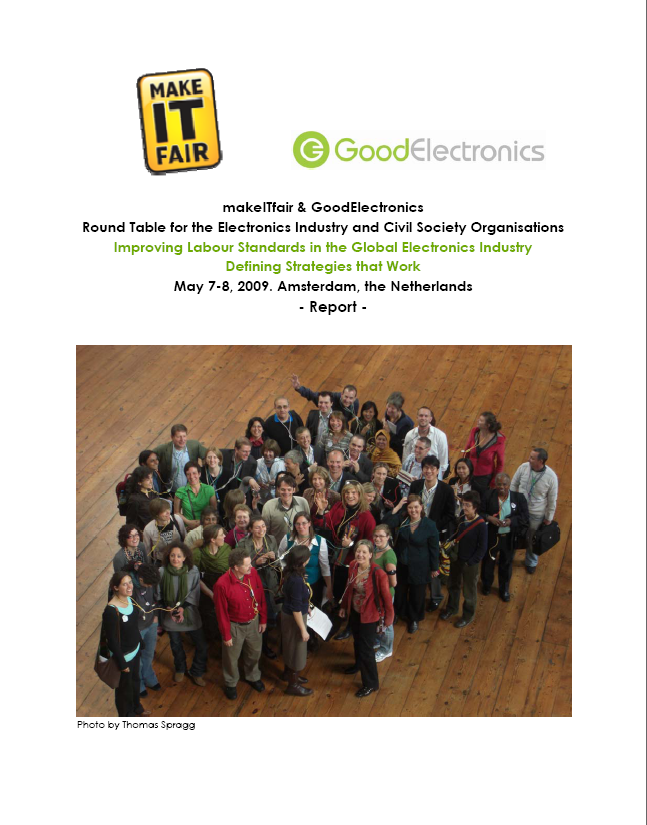
‘How do we connect?’ makeITfair and GoodElectronics Round Table report on-line
The report of the makeITfair and GoodElectronics may 2009 Round Table is now available on-line. The report gives a summary of the presentations that were made and the topics that were discussed during the meeting, as well as a list of proposals for follow up actions.
On 7 and 8 May 2009, about 25 corporate participants representing a host of different electronics companies and as many as 35 representatives of civil society organisations gathered in Amsterdam for a round table meeting. The Round Table was organised by makeITfair and GoodElectronics. Different branches of the electronics industry were present, such as brand name companies, manufacturers and telecom providers, as well as business’ CSR initiatives Electronics Industry Citizenship Coalition (EICC) and the Global e-Sustainability Initiative (GeSI). Civil society was represented by organisations as diverse as Southern trade unions, the International Metalworkers Federation (IMF), the European Metalworkers Federation (EMF), European campaigning organisations, shareholder activists and many other NGOs. The objective of the round table was to provide information on the current labour issues in the global electronics industry in order to enable a better understanding of these issues. Also, the round table aimed to find common ground between the industry and civil society organisations for effective strategies that bring about lasting improvements of labour conditions in this sector. It was quite a unique gathering. Not often before were these topics discussed this openly by as many different participants, all of them bringing their own – often diverging – interests and analyses to the table.
Possible next steps
It is good to realise that the electronics sector is not starting from scratch. The EICC started five years ago. Years of working with codes of conduct and social auditing have yielded important insights in the occurrence of labour issues and how to solve them. There are lessons to be learned from initiatives developed in other sectors. Despite fundamental differences of opinion between the industry and civil society, there is also common ground. All agree on the need of labour issues to be addressed in times of prosperity as well as in times of economic recession. The current crisis can not be an excuse to neglect workers’ rights, although the margins to operate for companies may be smaller.
Concrete proposals
-
The electronics industry and trade unions to invest in making contact, on international,national level as well as factory level, to work towards formal social dialogue;
-
EICC, GeSi, individual companies as well as civil society organisations to continue to make an effort to reach out to each other in order to set up structural forms of stakeholder consultation and collaboration, especially in Southern and Eastern European production countries;
-
EICC and GeSi to include further discussion on freedom of association and collective bargaining on the agenda of their upcoming meetings;
-
The EICC Stakeholder Work Group to organise a follow up session with the attendants of the Round Table;
-
The electronics industry/EICC to engage with the Better Work programme in order to set up Better Work activities in electronics production countries;
-
The electronics industry to meet with representatives of the garment sector and learn from the latter’s experiences with code development in a multi stakeholder setting;
-
Individual companies to think about upgrading their individual codes of conduct, by referring to ILO conventions on freedom of association, right to bargain collectively and a living wage; and by including clauses on labour agencies, migrant labour, etc.;
-
EICC to continue and expand its code review process;
-
Companies and civil society to share thoughts on how to gear up purchasing practices by including penalties and (financial) incentives for suppliers;
-
Research to be undertaken into the adherence to labour rights in EPZs;
-
Companies to gather and provide quantitative data on factory level on the percentage of workers recruited and hired by labour agencies;
-
Further thinking about an acceptable ratio of regular workers – contract workers;
-
Companies and civil society organisations to exchange information on gender, labour migration and occupational health and safety issues (including ‘standing operations’;
-
Elaborating a business case for a living wage;
-
Elaborating a in-depth cost-benefit analysis of electronics production;
-
Joint engagement between industry and civil society on a national level, bringing together supply chain actors to explore the possibilities to set up national or regional forums focused on bringing about improvements in labour conditions;
-
Joint engagement between industry and civil society on training projects – targeting workers, local management and CEO level management with different types of
training.
Time frame
Resources and capacities are limited, so hard choices have to be made where to focus the efforts. NGOs and trade unions hold on to the ILO standards, emphasizing that these are agreed upon by labour, governments and business. Flexibility must thus be applied to the time span, bearing in mind that changes will not happen overnight. Experiences in the garment industry point in the same direction. On the one hand, a company confirms the impossibility of achieving massive changes, and emphasizes the need to take ‘baby steps’ – to realise small changes before big changes can be achieved. Civil society on the other hand stress that the great challenge is to set up a realistic, viable process, whilst not forgetting the serious problems that workers face. For the workers, these are very urgent matters. One NGO points out that at this point in time workers are radicalising, fed up and frustrated with the enormity of the problems they are facing. Taking ‘baby steps’ may go too slow.
Related news
-

-
Chain of consequences Published on:
 Joshua RosenzweigPosted in category:Publication
Joshua RosenzweigPosted in category:Publication Joshua Rosenzweig
Joshua Rosenzweig
-



